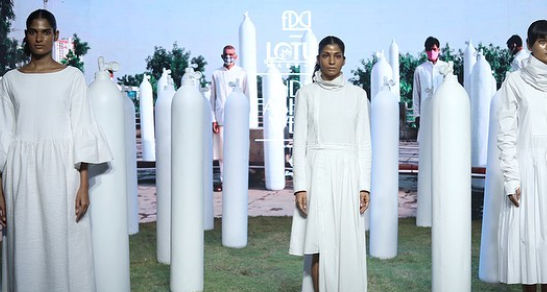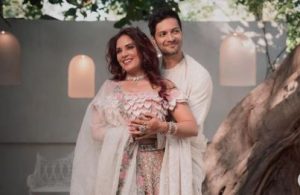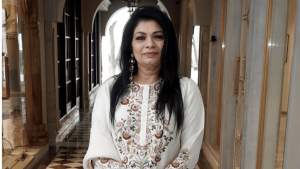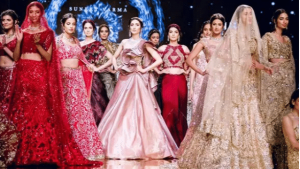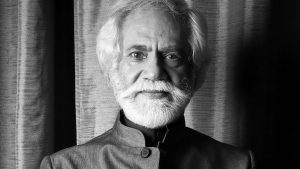The year 2020
witnessed fashion taking a digital route with the country’s major fashion shows
opting for the online mediums to stay connected with their patrons while
maintaining the pandemic protocol.
From International fashion extravaganzas like Paris, Milan, London, or New York
Fashion week to India’s major fashion events like India Couture Week, Bridal
Week and Lakme Fashion Week, it was all about feasting your eyes from a
distance.
Though the charm of the ‘feel and touch’ of cloth was missing, the virtual
events did reap benefits for organizers.
Sunil Sethi, president of the Fashion Design Council of India (FDCI), the apex
fashion body of India, told Opoyi, “ Just when we thought that the year 2020
will go down as a year where business was at a standstill and due to the
lockdown and closure of factories, no retail, the workforce not being able to
come back from their villages and everything looked gloom and doom, there was
an awakening with two fashion weeks and two stock room sales.”
“Within these four things, there was business being conducted and everybody
understood the power of digital media and the online e-commerce stay so come
September and in October, events like couture week, India fashion week and also
stock room sales gave us hope that all is not over for the fashion industry and
people are still longing and buyers are still there. It promised a new hope for
2021. So I think that is the best thing that had happened .”
He says that 2021 will also include digital as an option.
“The Jury’s verdict is out and the result is that digital has to be part of
anything related to fashion and it will play a more important role in the
future,” he said.
Rahul Mishra, one of the few faces of Indian fashion week who took Indian
craft and textile to the world map and received a great response at fashion
weeks in Paris and Milan, says that “carrying a part of lustre and glamour from
the fashion week, digital shows have proven to be an effective but
replacement.”
“While in a physical show a garment is to be fleeting, past the viewer in 10
seconds, the multi-dimensional fashion films enable a zoomed-in view of the
craft that a designer would like to showcase. Earlier, I used to believe that
multi-sensory physical shows are the ideal way to showcase fashion; however,
digital runways have turned out to be quite a unique experience with a
reimagined way of storytelling,” he told Opoyi.
While he believes that one has to eventually return to the larger than life,
stimulative set-ups to completely experience the creative expression of a
designer, the digital shows shall continue to find relevance parallelly,
considering their accessibility and ease of execution.
“At the business front, brands are realising the importance of customer
service. At the time, people want to only invest in luxury that holds value in
terms of quality, craftsmanship, individuality, authenticity and human emotion.
Fashion that fails to offer the same, has had to find redefinition. Many brands
have forayed into online retail where their products are more accessible to
their clientele worldwide.
“They are collectively learning to effectively utilise technological tools for
one-on-one communication, especially in the case of couture brands where human
interaction is of utmost importance. We as a brand, take it a step further by
allowing for increased level customisation in couture pieces hence, each piece
that eventually gets delivered is unique and allows for creative collaboration
between us and the client.
“Considering all the digital events and boom in luxury e-commerce, 2020 had
offered a significant change in an otherwise traditional setting in fashion and
luxury, highlighting the industry’s ability to adapt,” he said.
Even Neeta Lulla, who has been invited by The Academy of Motion Picture Arts
and Sciences to attend the Oscars 2021, “saw a new wave of normal with digital
becoming an imperative advent in our lives.”
“Fashion runways also got digital and the consumer sought to buy sitting in the
comfort of their own homes. As they say, life must go on and so does fashion,” Lulla
told Opoyi.
Looking at the changed scenario, many designers launched or expanded their
online presence too and designer Gautam Gupta, who runs a luxury fashion label
named Asha Gautam, was no different.
“Making one’s design visible is the objective every designer has and with
lockdown, digital is the best solution. Adapting to this new normal we also
started with our e-store and taking orders online. We introduced our festive
collection exclusively targeting the online market. I feel even when things get
normal the digital space will grow only in a few areas especially where the
price points are manageable and design is less complex,” he told Opoyi.
While the Industry is absorbing this new fashion wave, there are still those
who want the old times to come back soon.
“Of course this year has gone digital but I am very conventional in terms of
fashion showcasing. I always think that fashion has to have an emotional touch
and one should feel the fashion. We did a remarkable job in doing fashion week
digitally and a lot of collections were launched on social media but I miss the
touch. Also, you need the audience to react instantly so I am still waiting and
excited that things will be back to normal very soon,” Samant Chauhan told Opoyi.
He, however, feels that there is a change in fashion perception in 2020.
“I think this year after COVID, fashion has completely changed. We understand
the value of what we have and people are appreciating more of craftwork. Also,
there is a lot of talks on minimalism and timeless pieces, something that can
be worn again and again and these are the trend that we are observing,” he
said.
So with 2020 gone, hoping 2021 will be about adding more business in the world
of fashion both online and offline

